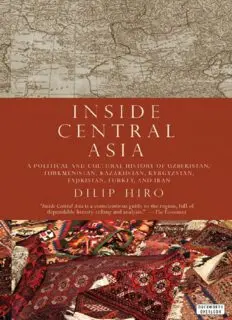
Inside Central Asia: A Political and Cultural History of Uzbekistan, Turkmenistan, Kazakhstan, Kyrgyzstan, Tajikistan, Turkey, and Iran PDF
Preview Inside Central Asia: A Political and Cultural History of Uzbekistan, Turkmenistan, Kazakhstan, Kyrgyzstan, Tajikistan, Turkey, and Iran
INSIDE CENTRAL ASIA Also by Dilip Hiro NON-FICTION After Empire: The Birth of a Multipolar World (2010) Blood of the Earth: The Battle for the World’s Vanishing Oil Resources (2007) The Timeline History of India (2006) The Iranian Labyrinth: Journeys through Theocratic Iran and Its Furies (2005) Secrets and Lies: Operation “Iraqi Freedom” and After (2004) The Essential Middle East: A Comprehensive Guide (2003) Iraq: In the Eye of the Storm (2003) War Without End: The Rise of Islamist Terrorism and Global Response (2002) The Rough Guide History of India (2002) Neighbors, Not Friends: Iraq and Iran after the Gulf Wars (2001) Sharing the Promised Land: A Tale of Israelis and Palestinians (1998) Dictionary of the Middle East (1996) The Middle East (1996) Between Marx and Muhammad: The Changing Face of Central Asia (1995) Lebanon, Fire and Embers: A History of the Lebanese Civil War (1993) Desert Shield to Desert Storm: The Second Gulf War (1992) Black British, White British: A History of Race Relations in Britain (1991) The Longest War: The Iran-Iraq Military Conflict (1991) Holy Wars: The Rise of Islamic Fundamentalism (1989) Iran: The Revolution Within (1988) Iran under the Ayatollahs (1985) Inside the Middle East (1982) Inside India Today (1977) The Untouchables of India (1975) Black British, White British (1973) The Indian Family in Britain (1969) FICTION Three Plays (1985) Interior, Exchange, Exterior (Poems, 1980) Apply, Apply, No Reply & A Clean Break (Two Plays, 1978) To Anchor a Cloud (Play, 1972) A Triangular View (Novel, 1969) INSIDE CENTRAL ASIA A POLITICAL AND CULTURAL HISTORY OF UZBEKISTAN, TURKMENISTAN, KAZAKHSTAN, KYRGYZSTAN, TAJIKISTAN, TURKEY, AND IRAN DILIP HIRO DUCKWORTH OVERLOOK This eBook edition 2013 This edition first published in the UK and US in 2011 by Duckworth Overlook LONDON 90-93 Cowcross Street London EC1M 6BF [email protected] www.ducknet.co.uk NEW YORK 141 Wooster Street New York, NY 10012 www.overlookpress.com Copyright © 2009 Dilip Hiro Epilogue © 2011 Dilip Hiro All rights reserved. No part of this publication may be reproduced, stored in a retrieval system, or transmitted, in any form or by any means, electronic, mechanical, photocopying, recording or otherwise, without the prior permission of the publisher. A catalogue record for this book is available from the British Library ISBNs Paperback: 978-0-71564150-7 Mobipocket: 978-0-7156-3956-6 ePub: 978-0-7156-4038-8 Library PDF: 978-0-7156-4039-5 CONTENTS MAPS PREFACE INTRODUCTION CHAPTER 1: Turkey: From Militant Secularism to Grassroots Islam CHAPTER 2: Uzbekistan: The Complex Hub of Central Asia CHAPTER 3: Turkmenistan: Molded by a Megalomaniac Despot CHAPTER 4: Kazakhstan: Rising Oil State Courted by Big Powers CHAPTER 5: Kyrgyzstan: The Tulip Revolution, A False Dawn CHAPTER 6: Tajikistan: The Rise and Fall of Political Islam CHAPTER 7: Iran: The Geopolitics of the Islamic Revolution SUMMARY AND CONCLUSIONS EPILOGUE NOTES SELECT BIBLIOGRAPHY INDEX Central Asian Republics and Their Neighbors Soviet Union 1918-1991 PREFACE D URING THE SOVIET ERA AND ITS IMMEDIATE AFTERMATH, THE CENTRAL Asian region was officially known as “Middle Asia and Kazakhstan.” In this book, however, the term “Central Asia” includes Kazakhstan. The names of the republics have undergone changes since the Bolshevik revolution of 1917, the latest version during the Soviet period being Uzbek Soviet Socialist Republic, Kazakh Soviet Socialist Republic, and so on. But once again, to simplify matters, I have used Kazakhstan, Turkmenistan, Uzbekistan, Tajikistan, and Kyrgyzstan (even though its 1993 constitution names it Kyrgyz Republic). In the course of providing the political, economic, and military history of the five Central Asian republics, I have at the appropriate points sketched a cultural profile of the peoples living in these countries. I have described their evolution from the era of nomadic cattle-rearing to the modern era of launching spacecraft, thus highlighting what has changed in their day-today existence and what has remained largely unchanged at the core. Every writer knows that to make sense of contemporary events one has to delve into the past. This is all the more so in the case of the Central Asian republics. They were delineated chiefly during the 1920s along ethnic lines, but containing some enclaves of those speaking a minority language, as a result of the policies devised mainly by Joseph V. Stalin (1878–1953). That is why this book’s Introduction covers the period up to his death. The breakup of the Soviet Union in 1991 signaled a new phase in the history of each of the Central Asian republics. Given the strategic location of Central Asia, its predominantly Muslim population, and its hydrocarbon and other valuable resources, the emergence of five independent states in 1991 opened up a fresh chapter in international relations—with the United States, China, Turkey, and Iran trying to fill the vacuum left by the collapse of Russia’s nearly 150- year-old dominance. By the end of the first decade of the twenty-first century— following several ups and downs in the fortunes of the competing foreign powers
